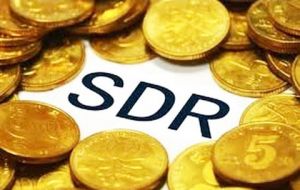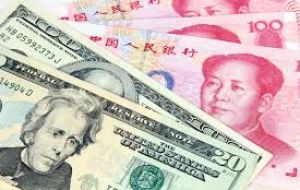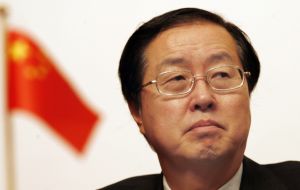MercoPress. South Atlantic News Agency
Yuan becomes global reserve currency but China will have to relax capital controls and the exchange rate
 Inclusion in SDR is largely symbolic for China, which for years has tried to impose the Yuan globally, partly to move the world away from reliance on the US dollar
Inclusion in SDR is largely symbolic for China, which for years has tried to impose the Yuan globally, partly to move the world away from reliance on the US dollar  The change will not lead to a precipitous rise in demand for Yuan because the total value of SDRs used as reserves pales in comparison to that of dollars.
The change will not lead to a precipitous rise in demand for Yuan because the total value of SDRs used as reserves pales in comparison to that of dollars.  Six years ago People’s Bank of China governor Zhou Xiaochuan started lobbying intensively for the inclusion of the Yuan in the SDR basket.
Six years ago People’s Bank of China governor Zhou Xiaochuan started lobbying intensively for the inclusion of the Yuan in the SDR basket. The Chinese currency Yuan entered a new phase in its journey to become more important to the world economy: starting on Saturday the Yuan is officially a member of the International Monetary Fund’s basket of global reserve currencies. Together, this group of currencies, known as Special Drawing Rights (SDR), forms a kind of pseudo-currency—used only by the IMF—to supplement countries’ official reserves.
The value of the SDR is determined by the set of currencies in the basket, (mainly the US dollar, Yen, Euro and UK Pound) each of which is given a weighting toward the final calculation. It is a very exclusive club, as far as currencies go. The Yuan is the first to be added to SDR since the Euro in 1999, though that was only to replace the phased-out Deutsche mark and French franc.
Inclusion in SDR is largely symbolic for China, which has been trying for years to promote the Yuan globally, in part to move the world away from reliance on the dollar as the prevailing reserve currency. The change will not lead to a precipitous rise in demand for Yuan because the total value of SDRs used as reserves pales in comparison to that of dollars.
In short, the Yuan will not be threatening the dollar’s reserve status anytime soon and will have a hard time doing so without further liberalization of the currency from the Chinese government. But at the very least, Beijing can say it has won a hard-fought battle to have its currency recognized by the IMF, which rejected its application to SDR in 2010.
However six years ago People’s Bank of China governor Zhou Xiaochuan started lobbying intensively for the inclusion of the Yuan in the SDR basket. But observers anticipate another objective behind Zhou's efforts, he saw it could be used as the means to vital domestic policy end.
For this Zhou persuaded his nationalistically-inclined but otherwise conservative compatriots in the Communist Party that membership of the SDR basket would confer enormous international prestige on China. Inclusion would endorse the Yuan as a top-rank international currency on a par with the US dollar, confirming China’s status on the world stage as an economic and financial superpower.
And accordingly Zhou’s party colleagues were so much taken by the bait that they were prepared to sign off on the IMF’s conditions for SDR membership. These include the requirement that SDR member currencies must be “freely usable”. But although use of the Yuan to settle China’s foreign trade has been growing in recent years, strict capital controls limited dealing of the currency on foreign exchange markets. When China made its first bid for SDR inclusion in 2010 the Yuan’s share of global currency trading was tiny – just 0.3% according to the Bank for International Settlements, no more than the Malaysian ringgit.
To gain entrance to the SDR club, clearly China would have to relax its controls and allow freer cross-border flows of capital. But the impossible trinity of international economics dictates that no country can allow free capital flows while simultaneously operating an independent monetary policy and maintaining a fixed exchange rate. You can have two of the three, but not all three together.
To become an SDR member, not only would China have to open its capital account, it would have to stop managing the Yuan’s exchange rate so rigidly against the US dollar, and allow its currency to move more freely in international markets.
What’s more, to preserve the stability of the domestic financial system in an environment of freer capital flows and greater exchange rate volatility, China would have to complete the overhaul of its domestic monetary system, moving away from a model which dished out capital according to centrally dictated quotas, and towards one which allocates capital according to market forces.
This was the real point of Zhou’s whole exercise. A fixed exchange rate and fixed credit quotas may have worked well enough during the early export- and investment-led stages of China’s growth, when the country was simply catching up with more advanced economies. But to navigate the next phase of consumption and innovation-driven development, China would need a more sophisticated model.
The currency could no longer be managed to achieve export competitiveness at the expense of consumers’ purchasing power, and interest rates would have to be liberalized so that capital could be allocated more efficiently than under the old state-directed system. Such radical reforms would face stiff opposition from entrenched interests: the export lobby which profited from a managed exchange rate, and the state companies which benefited from cheap loans. So Zhou sold his reforms by talking up the supposed glory of SDR membership.




Top Comments
Disclaimer & comment rules-

-

-

Read all commentsZimbabwe wants to use Yuan as its currency & l'm sure that l read somewhere that Cambodia already does(along with USDollars, Thai Baht & their own almost worthless money). A nightmare if you received your change in all 4 currencies!
Oct 03rd, 2016 - 10:53 am 0So the Chin have made it to Special Drawing Rights (SDR) and can now be considered with Grown Up monies: just in time for the IMF to supplement the countries’ official reserves, aka throwing money at them to stop their money going 'tit's up'.
Oct 03rd, 2016 - 12:19 pm 0Shades of The Dark Country coming to China methinks.
Well now china has opened it up,
Oct 03rd, 2016 - 12:57 pm 0I suppose we will see if it sinks or not,
lots of African countries queuing up to buy it,
so they say..
Commenting for this story is now closed.
If you have a Facebook account, become a fan and comment on our Facebook Page!